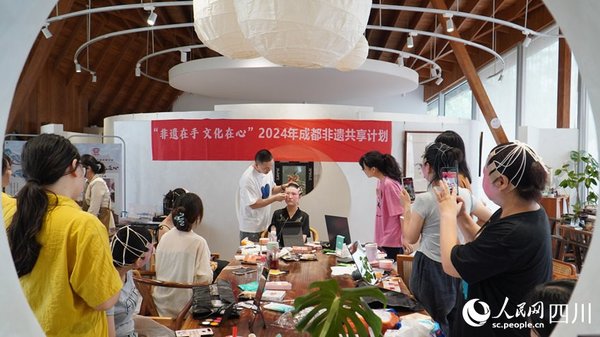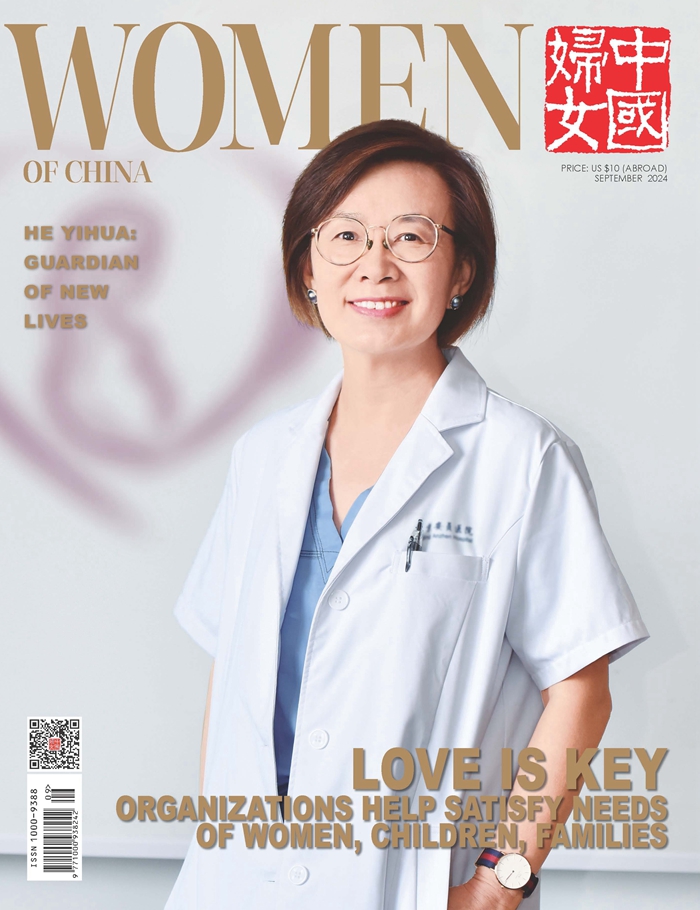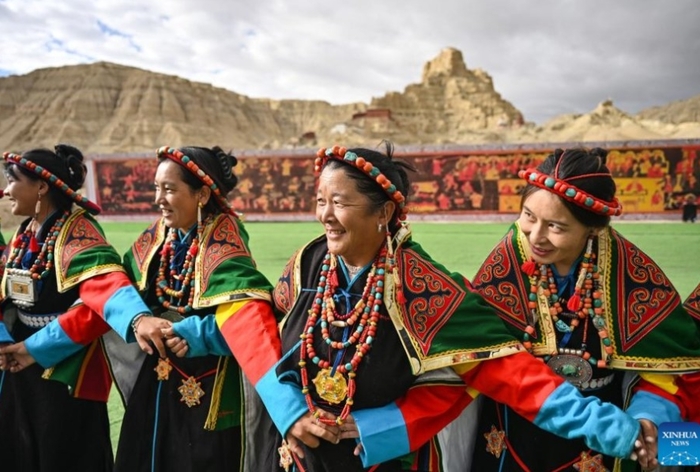Young People in SW China's Chengdu Swarm into Intangible Cultural Heritage Classes
Following the popularity of cultural centers, senior universities and colleges, and youth night schools, young people in Chengdu, capital of southwest China's Sichuan Province, are flocking to courses on intangible cultural heritage.
Every weekend, they go to different areas and venues in the city where intangible cultural heritage classes are held to "recharge" and improve themselves.
Ge Xinyue, a woman born post-1995 who has worked in Chengdu after completing her master's degree program, has been taking a course on Peking Opera makeup at the New Jinniu Park in Chengdu's Jinniu District.
 |
| Luo Ying, chief makeup artist from the Chengdu Peking Opera research institute in Chengdu, capital of southwest China's Sichuan Province, teaches students Peking Opera makeup techniques during a class on Peking Opera makeup. [People's Daily Online/Zhao Zule] |
"I am very interested in traditional Chinese culture, especially drama and traditional Chinese operas. I saw information about this course through the WeChat account of the Chengdu Municipal Center for Intangible Cultural Heritage Protection in July, so I set a reminder and managed to secure a spot," Ge said.
On the morning of Sept. 7, Ge took the last class of the course on Peking Opera makeup. The course was taught by Luo Ying, chief makeup artist of the Chengdu Peking Opera Research Institute and Jinniu district-level representative inheritor of the intangible cultural heritage of Tian-Tsui, which is a traditional Chinese jewelry-making auxiliary craft.
From opera makeup to hairstyling, and then to wearing costumes and accessories, the two-hour class quickly passed, and the students, fully dressed, excitedly showcased their learning achievements.
"It looks really amazing," Ge exclaimed. "If I have the opportunity, I would love to delve deeper into Peking Opera dressing, not just makeup. I hope that one day, I can see Peking Opera characters dressed by me performing on stage."
"The students who come to my class are mostly born in the 1990s and 2000s. After spending nearly two months with the students, I can truly feel that they genuinely love Peking Opera makeup. Not a single person gave up halfway through the course, which touched me deeply," Luo said.
According to credible sources, this year marks the second year that Chengdu has offered courses on intangible cultural heritage.
Building on the success of last year's popular courses such as the Shu (Sichuan) School of Guqin, a traditional Chinese musical instrument, and rope weaving, new courses have been launched this year, including Peking Opera makeup, health preservation with traditional Chinese medicine (TCM), Shu embroidery, and Chengdu lacquerware art.
These courses have been rolled out gradually since July, and each course is almost fully booked within a minute of its release.
The incredible value they offer is the primary reason for the popularity of these courses, according to Zheng Qiling, an official from the Chengdu Municipal Center for Intangible Cultural Heritage Protection.
All the courses on intangible cultural heritage and the materials used in the classes are provided free of charge, and students don't need to bring anything, Zheng said.
Moreover, the teachers are specially invited inheritors of various intangible cultural heritage projects, Zheng noted.
Intangible cultural heritage possesses unique artistic charm and historical value, providing young people with fresh experiences and creative inspiration, pointed out Peng Yunsi, an expert in intangible cultural heritage protection and deputy head of the Chengdu Municipal Center for Intangible Cultural Heritage Protection.
"More and more young people are beginning to value the inheritance and protection of local culture. As an important part of traditional culture, intangible cultural heritage can enhance people's cultural identity and national pride," Peng said.
To cultivate students' long-term interest in relevant courses, the Chengdu Municipal Center for Intangible Cultural Heritage Protection and inheritors of intangible cultural heritage have put in a great deal of effort, from designing course content that appeals to young people to innovating teaching methods.
Wei Yuping, Deputy Head of the Chengdu Guqin Cultural Society and inheritor of the Shu School of Guqin in Qingyang District of Chengdu, has incorporated familiar and easy-to-learn pieces into the regular content of her course on Guqin, in a bid to help students better immerse themselves in the classes and enjoy the learning process.
To provide students with more opportunities to practice, master playing techniques, and cultivate long-term interest, Wei has also offered practice venues and instruments for students, and has set up a chat group for communication as a supplement to offline teaching.
Jiang Yue, a post-2000-born music-loving sophomore, has benefited greatly from the course on Guqin. She mentioned that initially, she just wanted to give it a try, but after attending a few classes she fell in love with this ancient instrument.
"Practicing the Guqin allows me to calm down, slowly settle, regulate my emotions, and heal my mind," Jiang said.
"If you want to practice the Guqin after class, you can make a reservation online, and it's completely free. If you don't want to come to the classroom to practice, you can rent a Guqin for a few yuan to practice at home," said a student named Lyu Qianwen.
According to Peng, the Chengdu Municipal Center for Intangible Cultural Heritage Protection will continuously optimize and update course content to meet the needs of different age groups and interest groups, keeping the intangible cultural heritage classes fresh and attractive.
"Some students have said that after attending the courses on intangible cultural heritage, they want to continue developing in relevant fields and may consider starting a business related to intangible cultural heritage in the future, which is exactly the effect we hope to achieve," Peng said.
"The original intention of launching the courses on intangible cultural heritage is to build a bridge between inheritors of intangible cultural heritage and interested individuals," Peng noted.
Statistics show that Chengdu is home to 25 national-level representative intangible cultural heritage projects, 87 provincial-level representative intangible cultural heritage projects, and 118 municipal-level representative intangible cultural heritage projects, as of August 2024.
In addition to intangible cultural heritage classes, the Chengdu Municipal Center for Intangible Cultural Heritage Protection has also carried out various activities in recent years to integrate intangible cultural heritage experiences into schools and the lives of citizens.
"I hope to see more youthful energy join the revitalization of intangible cultural heritage, creating new sparks between traditional crafts and contemporary young people, and bringing new vitality to traditional culture in the modern era," Peng said.
(Source: People's Daily Online)
Editor: Wang Shasha
Please understand that womenofchina.cn,a non-profit, information-communication website, cannot reach every writer before using articles and images. For copyright issues, please contact us by emailing: website@womenofchina.cn. The articles published and opinions expressed on this website represent the opinions of writers and are not necessarily shared by womenofchina.cn.






.jpg)

 WeChat
WeChat Weibo
Weibo 京公网安备 11010102004314号
京公网安备 11010102004314号